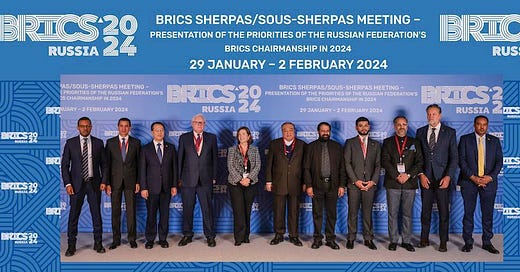The road to a multipolar world passes through Moscow
BRICS Sherpa meeting in Moscow discusses bloc's future and new member integration, with Russia advocating for a multipolar world order, countering Western dominance, amidst US and European opposition.
As the bitter cold of the Moscow winter recedes, the warmth of renewed global cooperation takes root. In the golden halls of power, far from the watchful gaze of the Western media, leaders are charting a new course, one that aims to give the world majority a voice.
These days, high-level representatives of the BRICS countries (Brazil, Russia, India, China, and South Africa) have gathered in Moscow. They were joined by delegates from the new members of the bloc: Egypt, the United Arab Emirates, and Iran. Saudi Arabia was absent with good reason.
These delegates are known as 'Sherpas', or key negotiators who pave the way for the heads of state. Named after the Nepalese guides who open the paths to the mountain peaks, they work out the details before the most important speeches are made.
Inside the vaulted rooms of the Foreign Ministry, the Sherpas will discuss the plans for the new, expanded BRICS alliance. Their goal is to build consensus and integrate Saudi Arabia and other new members into the bloc. But Riyadh's empty seat at the table revealed the cracks behind the scenes.
Although Saudi Arabia formally joined the BRICS on 1 January, its status remains uncertain. Despite public statements, sources say that behind-the-scenes disputes in Riyadh have delayed full engagement. While the princes in white robes weigh geopolitical calculations, their Sherpas remain idle.
Yet the work continues. In his opening speech, Foreign Minister Lavrov was direct: the era of Western hegemony must end. The United States and its allies can no longer impose their will on the world. The solution, he argued, is a revitalized UN system in which all voices are heard, not just those of the traditional powers.
But Washington pursues a different path. Hampered by domestic problems and fearful of the decline of its influence, it fuels conflicts abroad. Its leaders denounce the rise of the BRICS as a threat to its dominance. But their rhetoric is hollow.
China, with its Belt and Road Initiative, offers developing countries investment and opportunities. India's technology sector fuels global innovation. South Africa connects the West with a dynamic continent. And Russia provides energy to fuel growth. Now, as new partners join, the bloc's reach expands and the entry of new members is one of the topics that will feature at the Kazan Summit in October.
The Western media deride these nations as autocratic regimes. But in the streets of Cairo, Riyadh, and Tehran, people feel the wind of change. After decades of Western intervention, they see hope in a new paradigm led by the East. Local leaders understand their cultural values better than any American president.
However, the transition will not be easy. The US and Europe will not relinquish power softly and abruptly. Expect sabre rattling, sanctions, and thinly veiled racism. However, the BRICS offers a model for developing nations that want to connect with non-Western powers. Together, their potential is unlimited.
The barricades around the old institutions are crumbling. As the world shrinks, people cross borders to grasp the hands of others. Of course, tensions and conflicts remain. But open dialogue can overcome distrust. If we listen with empathy, embrace our common humanity, and chart a course of cooperation, the future is limitless.
In Moscow, the work continues. Leaders plan, strategize and slowly put together a new world order. Meanwhile, Western capitals slumber. But when they wake up to a transformed world, will it be too late?
We are at a crossroads in history. All directions are possible. But the path we choose will reverberate for generations. With wisdom and courage, humanity can reach new heights. But we must take the first step.





